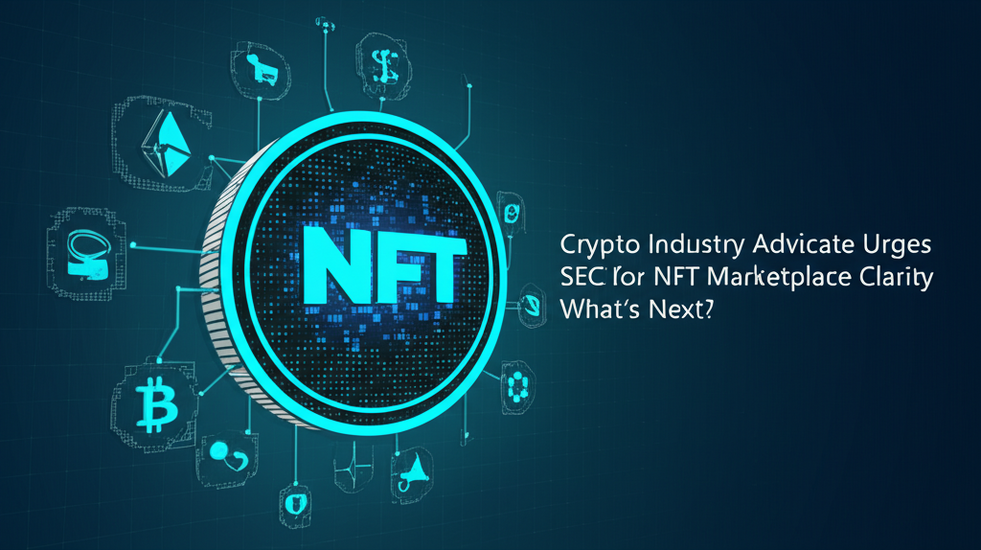Crypto Industry Advocate Urges SEC for NFT Marketplace Clarity: What’s Next?

The digital asset industry is calling on the United States Securities and Exchange Commission (SEC) to provide definitive guidance clarifying that NFT marketplaces should not be designated as exchanges or brokers under existing U.S. securities laws. This request aims to remove regulatory uncertainty surrounding the burgeoning NFT sector.
An industry leader has formally addressed SEC Commissioner Hester Peirce, advocating for a clear statement that NFT marketplaces, like leading platforms, do not meet the criteria to be classified as exchanges under federal securities laws. The core argument centers on the unique nature of NFTs.
It is argued that NFT platforms fundamentally differ from traditional exchanges or brokerages. They typically do not handle transaction processing directly, nor do they function as intermediaries that bring together numerous sellers for the same asset. This distinction is crucial given the regulatory framework designed for fungible securities.
[OpenSea argues that NFT platforms don’t fit the legal definition of an exchange or broker because they don’t handle transactions, act as intermediaries, or bring together multiple sellers of the same asset.]
The argument emphasizes the inherent non-fungibility of most NFTs. The majority of NFTs represent unique digital assets, where each token typically has a single seller. This characteristic, it’s argued, removes these assets from the conventional regulatory scope applied to securities traded across multiple parties. All transactions are executed via smart contracts.
Furthermore, all NFT transactions occur directly on the blockchain through automated smart contracts, completely independent of centralized platforms. Users retain direct custody of their digital assets, initiating all transactions through their own wallets. Platforms provide the means to discover NFTs and connect buyers with sellers, operating more as a discovery interface than a traditional financial intermediary.
Given this decentralized framework, it’s asserted that traditional regulatory requirements—such as capital maintenance mandates, extensive record-keeping obligations, and specific professional conduct standards—are both unnecessary and poorly suited to the operational models of NFT marketplaces. This argument may also apply to other sectors of the crypto industry. For example, Decentralized Autonomous Organizations (DAOs) also operate with a similar framework.
The industry also contests the classification of NFT marketplaces as brokers under the Exchange Act. They emphasize that these platforms do not offer investment advice, negotiate or execute transactions on behalf of users, hold custody of user assets, or provide financing or documentation services traditionally linked to broker activities.
Drawing on previous legal arguments, the industry refers to the SEC v. Coinbase case. This case established that providing wallet software and access to market pricing data does not, on its own, constitute broker status. Highlighting listings or trending NFTs does not equate to providing investment advice or functioning as a regulated intermediary.
To mitigate ongoing uncertainty, the SEC is urged to issue informal guidance clarifying that NFT marketplaces do not fall under exchange or broker regulations.
[To remove ongoing uncertainty, OpenSea urged the SEC to issue informal guidance, making it clear that NFT marketplaces are not subject to exchange or broker regulations.]
The recommendation includes issuing an interpretive release or a staff bulletin to clarify how Rule 3b-16—which defines securities exchanges under federal law—applies specifically to NFT marketplaces. This mirrors similar guidance provided recently on memecoins and stablecoins, aiming for regulatory clarity. This clarification would benefit NFT collectors, buyers, and sellers, fostering growth within the broader NFT ecosystem by alleviating regulatory ambiguities. For additional insights, explore blockchain technology applications.
The ambiguity surrounding the security status of NFTs intensified, highlighting the need for clearer regulatory frameworks. This move towards clarity could significantly shape the future of digital asset regulation, ensuring a more stable and innovative environment for crypto and NFT technologies. Furthermore, understanding DeFi trends is crucial in navigating the evolving landscape of digital finance.
